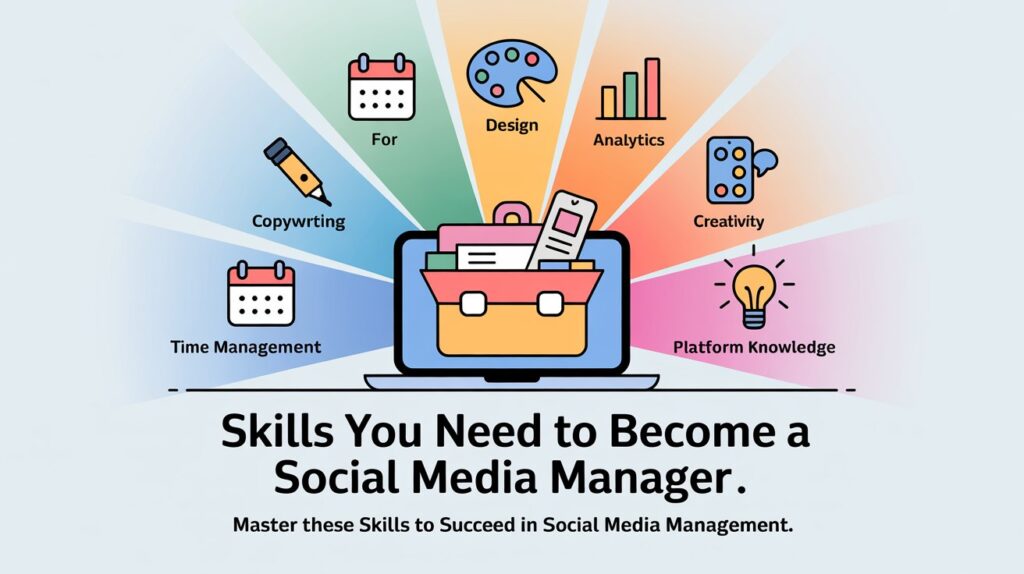If you love spending time on Instagram, TikTok, Twitter (now X), or LinkedIn—and you’ve got a knack for creating content that gets noticed—you might just have what it takes to become a social media manager. With businesses of all sizes racing to grow their online presence, the demand for skilled social media managers has never been higher.
In this guide, you’ll learn exactly what a social media manager does, how to get started, and how to grow into a successful career—no matter your background. Whether you’re a student, a freelancer, or someone switching careers, this guide will walk you through everything step by step.
What Is a Social Media Manager?
Roles and Responsibilities
A social media manager is the person behind the posts you see on a brand’s Instagram, Facebook, Twitter, or TikTok. They plan, create, post, and analyze content to grow a brand’s online presence.
Some of the key tasks include:
- Writing captions
- Designing graphics
- Scheduling posts
- Responding to comments and messages
- Running ads
- Tracking metrics like reach, likes, and engagement
In-House vs Freelance vs Agency
- In-House: You work for one company and manage its social accounts full time.
- Freelance: You work for multiple clients and set your own schedule.
- Agency: You work with a team that handles social media for several brands.
Each has pros and cons, but all can lead to a great career.
Why Social Media Management Is a Promising Career
High Demand
From startups to global brands, almost every company needs someone to handle their social presence. That means job opportunities are everywhere.
Remote Work & Flexibility
Most social media jobs can be done from anywhere with a good internet connection. It’s perfect if you want flexibility or to work from home.
Room for Growth
You can start as an assistant and work your way up to content strategist, social media director, or even start your own agency.
Skills You Need to Become a Successful Social Media Manager

Hard Skills
- Content Creation: Writing engaging captions, creating posts, and planning content
- Copywriting: Knowing how to write in a brand’s voice
- Graphic Design: Using tools like Canva or Adobe Express
- Analytics: Understanding what’s working and what’s not
- Scheduling Tools: Knowing how to use Buffer, Later, or Hootsuite
Soft Skills
- Creativity: Coming up with fresh ideas
- Communication: Talking with clients or team members clearly
- Trend Awareness: Knowing what’s hot on social media
- Time Management: Juggling posts, messages, and deadlines
- Problem Solving: Handling negative comments or failed posts
Step-by-Step Guide to Becoming a Social Media Manager
Step 1 – Learn the Basics of Social Platforms
Spend time studying how each platform works—what performs well on Instagram might flop on LinkedIn. Understand the different tones, formats, and algorithms.
Step 2 – Take Courses and Certifications
Free and paid courses can help you learn faster:
- Meta Blueprint (for Facebook/Instagram)
- HubSpot Academy
- Google Digital Garage
- Coursera (Social Media Specializations)
Step 3 – Build Your Own Online Presence
You can’t be invisible online and expect clients to trust your social media skills. Build your LinkedIn, post on Instagram, and maybe even share tips on Twitter or TikTok.
Step 4 – Practice with Real or Simulated Accounts
Offer to help a local café, NGO, or your friend’s clothing brand. Even unpaid work can give you the experience to build a killer portfolio.
Step 5 – Learn Design and Video Tools
Even basic skills with tools like:
- Canva (for graphics)
- CapCut or InShot (for video editing)
Can help you stand out big time.
Step 6 – Understand Analytics and KPIs
You’ll need to know what to track:
- Engagement rate
- Click-through rate (CTR)
- Follower growth
- Reach and impressions
Step 7 – Start Freelancing or Interning
Look for gigs on:
- Upwork
- Fiverr
- Internshala (India)
- Freelancer
You’ll gain confidence, feedback, and client experience.
Step 8 – Build a Portfolio and Gather Testimonials
Show off your best work. Include screenshots, engagement numbers, and before/after comparisons. Ask happy clients to write a few lines of feedback.
Step 9 – Stay Updated With Trends and Changes
Social media moves fast. Subscribe to:
- Later Blog
- Social Media Examiner
- Creator-focused YouTube channels like Vanessa Lau or Neil Patel
Step 10 – Consider Specializing
You can niche down and become a pro in:
- E-commerce
- Personal branding
- Real estate
- Fitness
- Beauty or fashion
Tools Every Social Media Manager Should Know
Content Scheduling
- Buffer
- Later
- Hootsuite
Analytics
- Google Analytics
- Facebook Insights
- Instagram Analytics
Design Tools
- Canva
- Adobe Express
- Figma (for advanced users)
Collaboration Tools
- Trello (task management)
- Notion (organizing content plans)
- Slack (team communication)
How Much Can a Social Media Manager Earn?
Freelance vs Full-Time
- Freelancers can charge hourly ($15–$100+ per hour) or monthly ($300–$2000+ per client).
- Full-time managers in the US earn anywhere between $40,000 to $80,000/year.
Entry-Level vs Experienced
- Entry-level (0–2 years): $30,000–$45,000/year
- Mid-level (3–5 years): $50,000–$70,000/year
- Senior or Strategist: $70,000–$100,000+
By Country
- India: ₹20,000 to ₹5,00,000/year depending on skills and company
- UK: £25,000 to £50,000
- Remote: International rates may apply if you work with overseas clients
Common Mistakes to Avoid
- Ignoring analytics and posting blindly
- Copying other brands without originality
- Not engaging with your audience (social = two-way street)
- Posting just for the sake of posting
- Not understanding the brand’s voice and goals
Success Tips from Real Social Media Managers
- Plan your content at least a week in advance
- Don’t chase every trend—choose what fits your brand
- Focus on community, not just followers
- Repurpose content across platforms
- Set clear goals (e.g., more saves, more shares, more leads)
Final Thoughts
Becoming a successful social media manager isn’t about being online 24/7. It’s about strategy, consistency, creativity, and connection. You don’t need a fancy degree or a huge following to start. What you do need is curiosity, willingness to learn, and the drive to keep improving.
So start building your online presence today. Create, post, measure, repeat—and soon enough, brands will come looking for you.

